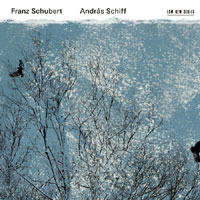Andrįs
Schiff • Franz Schubert
Andrįs Schiff, fortepiano  or more than three
decades now, Andrįs Schiff has been one of the most consistently stimulating musicians of
his time, rewarding the listener on ever-deepening levels by approaching his chosen
repertory strictly on its own terms rather than as mere vehicles for his own virtuosity.
This altogether remarkable set gives us a healthy serving of Schubert on the sort of
instrument the composer himself used. or more than three
decades now, Andrįs Schiff has been one of the most consistently stimulating musicians of
his time, rewarding the listener on ever-deepening levels by approaching his chosen
repertory strictly on its own terms rather than as mere vehicles for his own virtuosity.
This altogether remarkable set gives us a healthy serving of Schubert on the sort of
instrument the composer himself used.
One of Schiff’s earliest recordings, made in 1977, was a Hungaroton LP of relatively little-known Beethoven pieces, played on a Broadwood piano that had belonged to Beethoven himself; it was of course transferred to CD in the subsequent decade. Schiff never identified himself with the "original instruments" movement when it was first gaining strength; his 1982 Decca recording of Bach’s Goldberg Variations, in fact, provoked more than a few commentators to suggest that the ideal instrument for which the forward-looking composer must have created that work had just identified itself -- as none other than the modern piano. Schiff had not considered any other option. He was not entirely happy with that early Beethoven recording: the instrument, housed in the National Museum in Budapest, was not in the best condition, and at that time the young pianist was not interested in pursuing that sort of thing. In the late 1980s, however, as he recounts in his own contribution to the documentation of this new Schubert set, he had the privilege of playing Mozart’s Walter fortepiano, in Salzburg, in the very room in which Mozart was born, and that proved to be "a life-changing experience." The instrument Mozart had played in Salzburg, Schiff wrote, enabled that composer’s music to reveal its true character: "fresh, bold and new; the great C minor Fantasy KV 475 sounded like a miniature Don Giovanni. . . . " Schiff was driven to research those period instruments, and came to feel that "(g)etting to know them is essential for the student, the scholar, the musician . . . Playing on fortepianos -- and on clavichords -- should be compulsory for all pianists." Eventually he purchased a fortepiano built in Vienna by Franz Brodmann in 1820, when Schubert was active, and made a gift of it to the Beethoven-Haus in Bonn, where it may be played in a room whose dimensions are just right for it. It was on that instrument, in that room, that the recordings under discussion here were made, in July 2014, and its sound is revelatory in these Schubert works, just as Schiff describes it:
Every bar of music on these two CDs bears out that judgment. Indeed, the listener is hardly aware of an interpreter at work, because of the quite astonishing level of spontaneity in these heady performances. No need to lay on blankets of interpretation over the remarkable substance of the marvelous B-flat Sonata, which seems to find itself at home here. The sound of the instrument is quite different from that of a modern concert grand, and may take some getting used to, but I’d venture that most listeners will warm to it effortlessly, because it suits this music down to the ground rather than getting in its way. The restraint from interpretive indulgence does not eliminate the sense of personality in these performances, but simply ensures that the personality that comes through so irresistibly is that of Schubert himself, or, one might say, the music itself -- for its seems to empower itself here, as it must have done when Schubert wrote it down. The music is not labored over, or invested with gratuitous overlays of added drama. What Schiff achieves here, without thrusting his own personality in the way of Schubert’s, is nothing less than the impression of allowing all of it to speak for itself, on a level of such intimacy, and such a natural sense of flow, that if the listener thinks of the performer at all, it is less as an interpreter than as an enabler -- and what greater acknowledgement can there be, after all, than to feel so directly connected to so extraordinary a creative force? Both of the large-scale, inherently dramatic sonatas register such impressions here, as do the various shorter pieces, particularly the less familiar Allegretto in C minor (which the unforgettable Artur Schnabel once recorded) and the "Hungarian Melody" which opens the proceedings here. (The Allegretto runs a few seconds shy of five minutes, not the nearly 15 shown in the booklet, but disc 2, which it opens, is very generously filled, running 78:30.) Schiff indicates that he has no intention of abandoning the modern piano for performances in large halls, but the intimacy as well as the power of this music register themselves here in a rather different and utterly persuasive way. The parenthetically aforementioned Schnabel was in his time one of the very few eminent pianists to make a specialty of the Schubert sonatas, which he described as "a safe supply of happiness" -- a phrase that inevitably comes to mind in discussing this set. The recording itself is superbly right for these performances of this music, and Mischa Donat’s expansive notes on the music itself is absolutely worth the price of admission in its own right. (Donat is also represented in the booklet by his translation of Michael Ladenburger’s very informative little background piece on the instrument.) All that might be added here, in case it is not crystal
clear by now, is the spelt-out advice to avoid any thought of doing without this
well-filled set, itself certifiable as "a safe supply of happiness." |
